Beijing Culture Forum spotlights civilizational diversity, mutual learning
A parallel forum focusing on civilizational diversity and exchanges was held Sept. 23 in Beijing as part of the 2025 Beijing Culture Forum. China International Communications Group (CICG) guided the event, titled "Exchanges and Mutual Learning: Respecting the Diversity of Civilizations," while the Academy of Contemporary China and World Studies organized it.
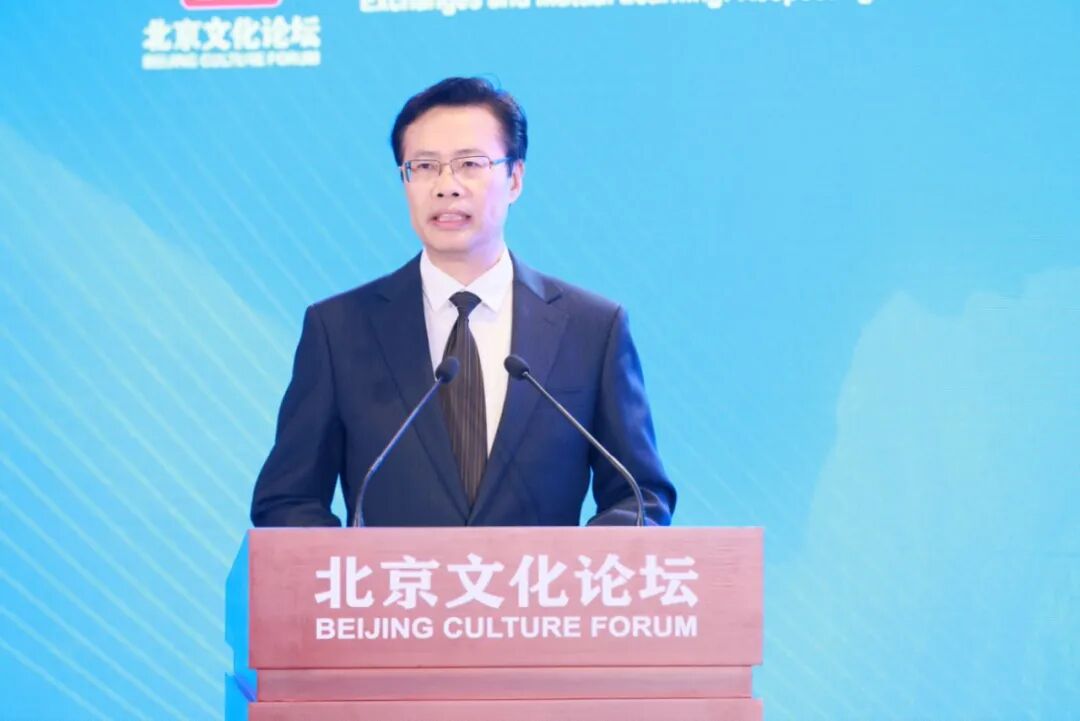
Yu Yingfu, vice president of China International Communications Group, delivers a keynote speech at the parallel forum "Exchanges and Mutual Learning: Respecting the Diversity of Civilizations" during the 2025 Beijing Culture Forum in Beijing, Sept. 23, 2025. [Photo courtesy of the 2025 Beijing Culture Forum]
Yu Yingfu, vice president of CICG, pointed out that Chinese civilization has always engaged in dialogue with other world civilizations with an open and inclusive mind, citing historical examples from Zhang Qian's missions to the Western Regions to Zheng He's seven voyages to the "Western Ocean" (the Indian Ocean), and from the eastward spread of Buddhism to the introduction of Western learning to the East. In today's deeply globalized world, respecting civilizational diversity and promoting exchanges and mutual learning are both a shared vision and an inevitable choice for humanity to move forward.
Yu said CICG, as a major international communication organization, will use the forum to strengthen global partnerships. The group plans to create more exchange platforms and pursue concrete cooperative results, he said. This approach would make civilizational diversity a lasting driver of human progress while providing cultural strength for building a community with a shared future for humanity.
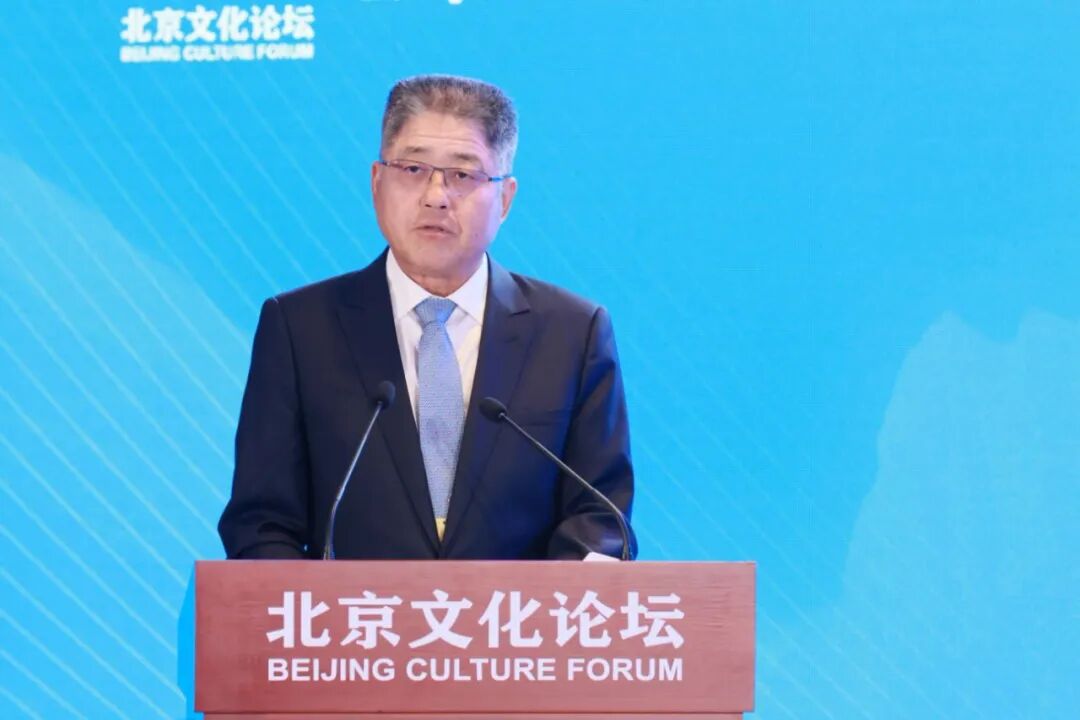
Le Yucheng, former vice minister of foreign affairs and former deputy director of the National Radio and Television Administration, delivers a keynote speech at the parallel forum "Exchanges and Mutual Learning: Respecting the Diversity of Civilizations" during the 2025 Beijing Culture Forum in Beijing, Sept. 23, 2025. [Photo courtesy of the 2025 Beijing Culture Forum]
Le Yucheng, former vice minister of foreign affairs and former deputy director of the National Radio and Television Administration, noted that digital technology and artificial intelligence are profoundly reshaping the way cultures and civilizations communicate and interact, opening new avenues for dialogue and mutual understanding. He called for leveraging digital intelligence to advance civilization building, foster the integration of culture and technology, and reinforce the value foundations of digital civilization.
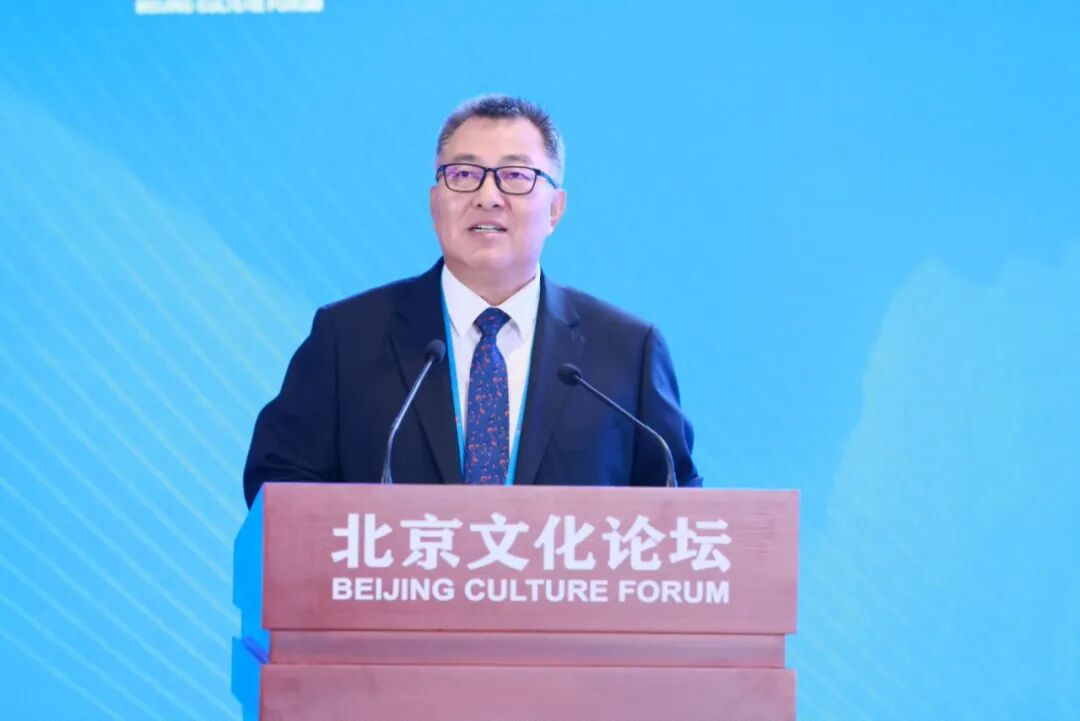
Wang Chunfa, former director of the National Museum of China and president of the China Science Writers Association, delivers a keynote speech at the parallel forum "Exchanges and Mutual Learning: Respecting the Diversity of Civilizations" during the 2025 Beijing Culture Forum in Beijing, Sept. 23, 2025. [Photo courtesy of the 2025 Beijing Culture Forum]
Wang Chunfa, former director of the National Museum of China and president of the China Science Writers Association, said civilizations are inherently diverse. True common prosperity requires exchanges based on equality, openness and inclusiveness, he said. Wang argued that promoting dialogue among civilizations needs coordinated efforts from all parties to foster communication and practical cooperation. Only by working together on global challenges can the world harness the collective strength of its civilizations to build a community with a shared future for humanity, he said.
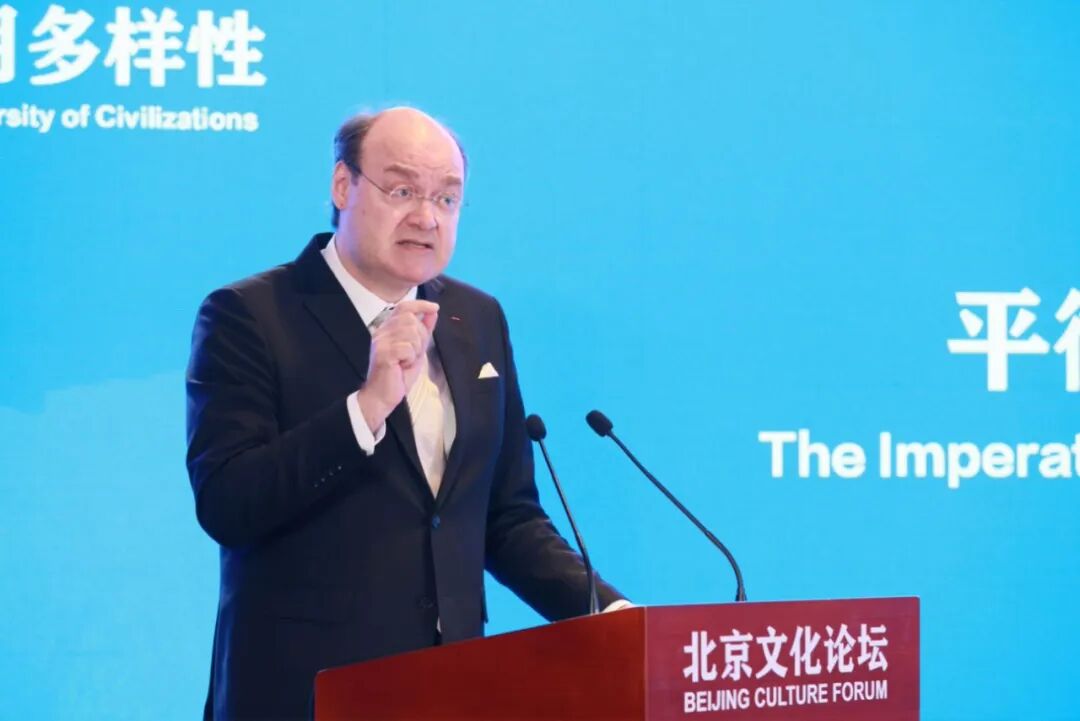
David Gosset, founder of the China-Europe-America Global Initiative and chairman of DG2CI, delivers a keynote speech at the parallel forum "Exchanges and Mutual Learning: Respecting the Diversity of Civilizations" during the 2025 Beijing Culture Forum in Beijing, Sept. 23, 2025. [Photo courtesy of the 2025 Beijing Culture Forum]
Building on Le's call for deeper integration of culture and technology, David Gosset, founder of the China-Europe-America Global Initiative and chairman of DG2CI, stressed that striking a balance between technology and the humanities is "not merely a nice ideal; it is an existential necessity."
He warned that in the pursuit of technological advancement, humanity risks neglecting the very disciplines that give life its depth and meaning. "Wisdom is not born of code," he said. "It is cultivated through reflection, through engagement with history, with ethics, with literature and art— through the humanities."
Gosset also emphasized that exchanges among cultures remain essential in today's interconnected and technologically advanced world. He called on participants to "remember what true civilization owes: to the classics, to the respect of the other, and to the mutual learning between cultures."
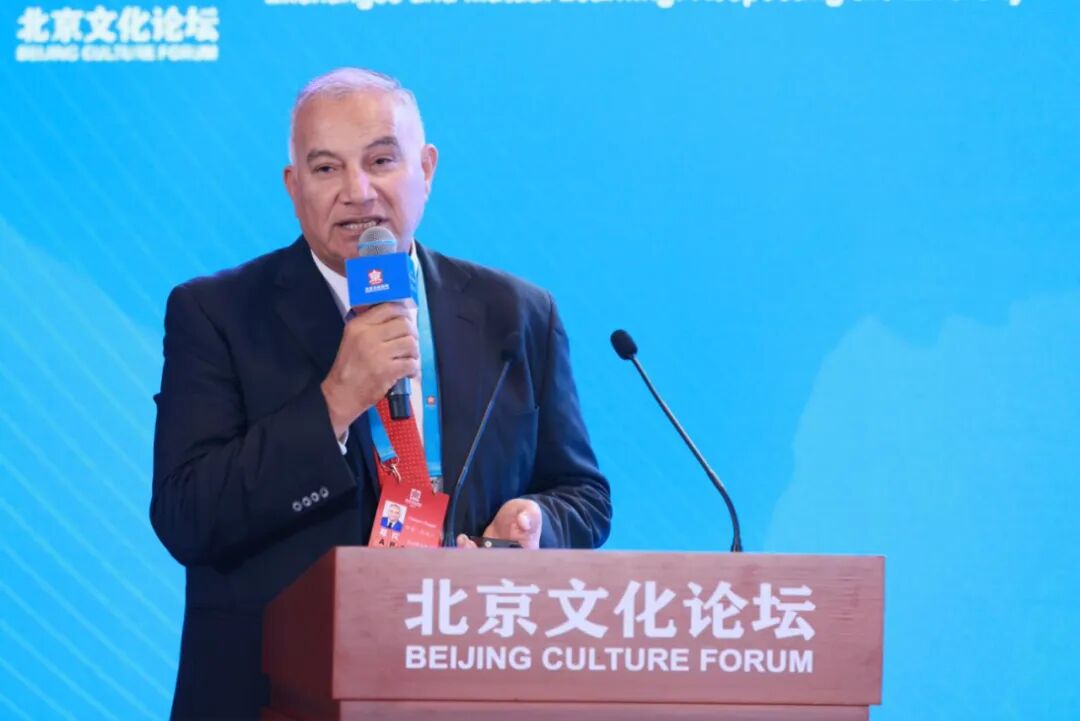
Hassan Ragab, director of the Confucius Institute at the Suez Canal University in Egypt, delivers a keynote speech at the parallel forum "Exchanges and Mutual Learning: Respecting the Diversity of Civilizations" during the 2025 Beijing Culture Forum in Beijing, Sept. 23, 2025. [Photo courtesy of the 2025 Beijing Culture Forum]
Hassan Ragab, director of the Confucius Institute at the Suez Canal University in Egypt, noted that human history is essentially a history of exchanges and mutual learning among diverse civilizations, and that such diversity is a vital source of progress for humanity. He urged countries around the world to deepen dialogue among civilizations on the basis of mutual respect, join hands to tackle common challenges, and expand exchanges in education, science, technology and culture.
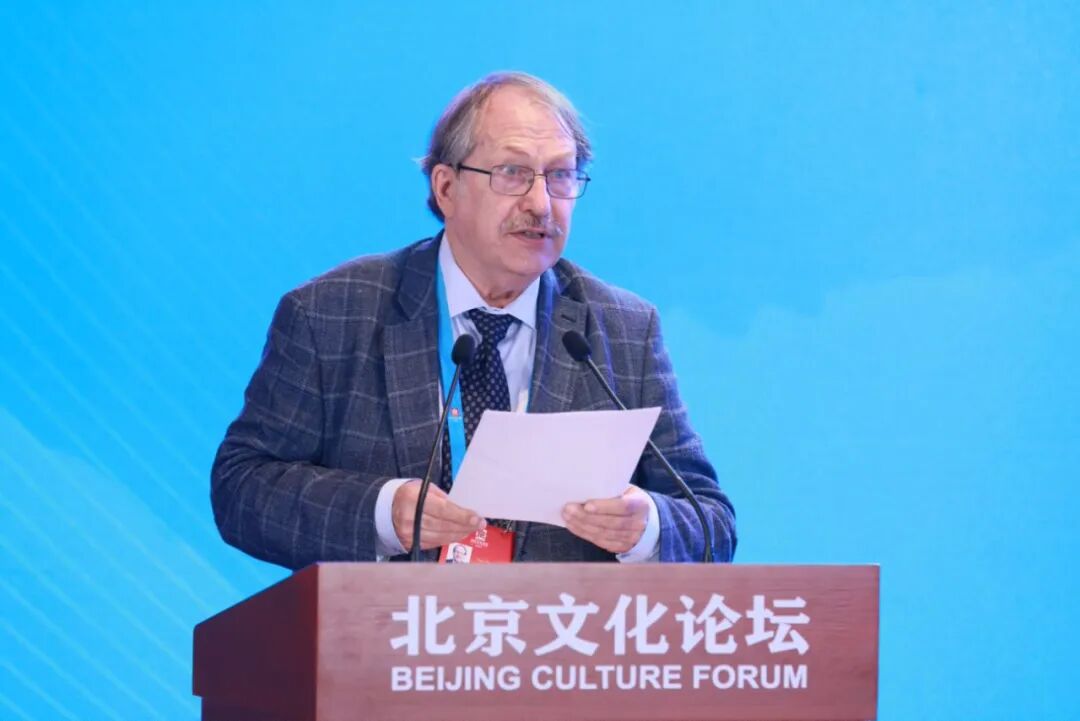
Yury Tavrovskiy, deputy chairman of the Russia-China Friendship Society, delivers a keynote speech at the parallel forum "Exchanges and Mutual Learning: Respecting the Diversity of Civilizations" during the 2025 Beijing Culture Forum in Beijing, Sept. 23, 2025. [Photo courtesy of the 2025 Beijing Culture Forum]
Yury Tavrovskiy, deputy chairman of the Russia-China Friendship Society, said that the ancient Chinese concept of "he er bu tong" ("harmony without uniformity") offers a powerful formula for the future of world civilization.
He said much work remains to remove communication barriers between people and called for greater support for cultural exchanges. "It is worth encouraging the activities of musical, theatrical and other groups, as well as individual creators of spiritual values," he said. He suggested easing visa procedures, offering transport and hotel discounts, and providing accessible venues for cultural programs.
Tavrovskiy cited China as an example, praising its significant investment and organizational efforts in cultural exchange. He said the launch of the Global Civilization Initiative had further established China as a "trendsetter" internationally. The initiative follows naturally from China's vision of building a community with a shared future for humanity, he noted.
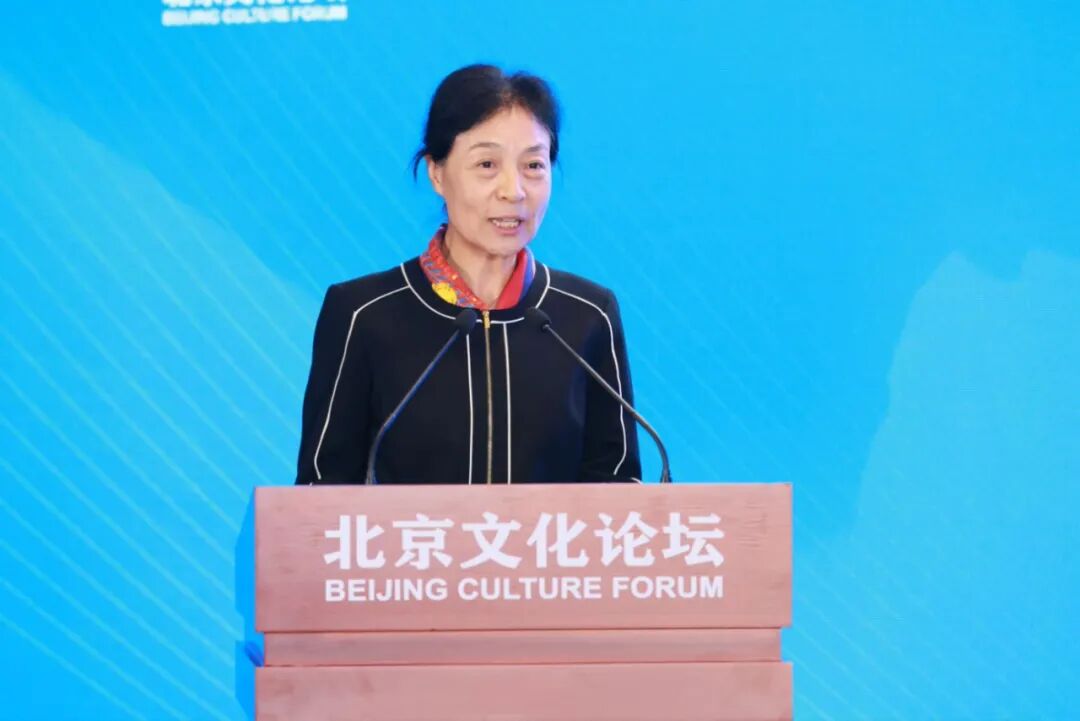
Li Yafang, associate editor-in-chief of China International Communications Group and president of the Academy of Contemporary China and World Studies, presides over the parallel forum "Exchanges and Mutual Learning: Respecting the Diversity of Civilizations" during the 2025 Beijing Culture Forum in Beijing, Sept. 23, 2025. [Photo courtesy of the 2025 Beijing Culture Forum]
Li Yafang, associate editor-in-chief of CICG and president of the Academy of Contemporary China and World Studies, said the parallel forum helped build consensus on inclusivity, coexistence and mutual learning among civilizations. The forum promoted practical cooperation among nations in respecting civilizational diversity, according to Li.
She said the participants' insights demonstrated considerable intellectual depth and practical value. Li noted that these insights offer useful inspiration for implementing the Global Civilization Initiative. They will help forge enhanced people-to-people and cultural exchanges, as well as deeper mutual understanding among nations.
The forum brought together over 100 participants from 23 countries and regions, including political figures, representatives of institutions based in China, experts, scholars, public figures and youth representatives.


